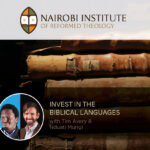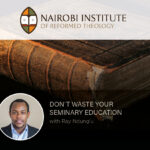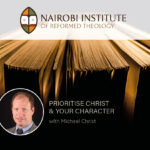Excellent Reformed and Evangelical conferences are held across Africa every year. The TGC Africa Podcast showcases select conferences to encourage and build up the local church across our continent.
This talk was delivered at the 2022 Evangelical and Reformed Conference which is held annually at the Skogheim Conference Center, Port Shepstone, KZN, South Africa. The conference theme was Life in Babylon and Ronald Kalifungwa preached 5 sessions on the first 3 chapters of Revelation calling us to a renewed vision of Jesus and his lasting commitment to His church.
Are you faithful? Would God commend you? As Pastor Ronald Kalifungwa asks, “Can it be said about you that you have no conscious controversy with God and with men?”
In the final part of this series in Revelation, we turn to the churches that were in excellent spiritual condition. These were churches who were in right fellowship with God and with others. They made a practice of regular repentance and were holding fast to the One who gives us the crown of life. This is what makes a church commendable in God’s sight. These churches had been faithful to Christ in the midst of trials and poverty and suffering. They had clung to Christ knowing that Christ would vindicate their character, their works and ultimately bring them safely home. Faithfulness is commendable.
Are you commendable?
Hear this challenge from Pastor Kalifungwa, “You cannot be indifferent as a child of God. You cannot be indifferent if you are a member of the church. You cannot be indifferent if Jesus is your Lord, if he has died for your sins, if he has redeemed you, if his Spirit lives in you. You cannot be indifferent if the Spirit’s purpose in indwelling you is to conform you to the image of Christ. You cannot be indifferent. You must be commendable.” To be commendable is to be faithful.
Other Content On This Topic
4 Ways to Read the Book of Revelation
7 Encouragements in the Christian Struggle for Perseverance
Why Did God Give Us The Book Of Revelation?
In the Midst of the Storm, “It is Well”
Event: 2022 Evangelical and Reformed Conference.
Location: Skogheim Conference Center, Port Shepstone, KZN, South Africa.
Transcript
Bible Readings And Final Greetings
Revelation 2:8,
“And to the angel of the church in Smyrna write: ‘The words of the first and the last, who died and came to life.
‘I know your tribulation and your poverty (but you are rich) and the slander of those who say that they are Jews and are not, but are a synagogue of Satan.
Do not fear what you are about to suffer. Behold, the devil is about to throw some of you into prison, that you may be tested, and for ten days you will have tribulation. Be faithful unto death, and I will give you the crown of life. He who has an ear, let him hear what the Spirit says to the churches. The one who conquers will not be hurt by the second death.” (Revelation 2:8-11)
Then our second reading is taken from chapter 3 verse 7.
“And to the angel of the church in Philadelphia write: ‘The words of the holy one, the true one, who has the key of David, who opens and no one will shut, who shuts and no one opens.
“I know your works. Behold, I have set before you an open door, which no one is able to shut. I know that you have but little power, and yet you have kept my word and have not denied my name. Behold, I will make those of the synagogue of Satan who say that they are Jews and are not, but lie—behold, I will make them come and bow down before your feet and they will learn that I have loved you. Because you have kept my word about patient endurance, I will keep you from the hour of trial that is coming on the whole world, to try those who dwell on the earth. I am coming soon.
Hold fast what you have, so that no one may seize your crown. The one who conquers, I will make him a pillar in the temple of my God. Never shall he go out of it, and I will write on him the name of my God, and the name of the city of my God, the new Jerusalem, which comes down from my God out of heaven, and my own new name. He who has an ear, let him hear what the Spirit says to the churches.” (Revelation 3:7-13)
Please turn your Bibles to Revelation chapters 2 and 3. Seeing that this is the very last meeting, I would like to begin by expressing my gratitude to the council that organizes and runs this conference, for inviting me to be a speaker at this conference once again. At the beginning of the year, the Evangelical and Reformed Conference was not among the places I was planning to minister at, but as God would have it, in his providence, here we are. It has truly been a pleasure and an honour for me to be here.
I’m thankful for Warren Pill’s ministry which has been a blessing to my soul, indeed a tonic to my soul. And I also enjoyed taking walks with some of you and speaking with many of you. Thank you for your friendship. And I thank God for the new bonds we have formed and the new memories we have created. I will pray for you when I remember you and also ask that you would do the same for me.
Our text is Revelation chapter 2. Those passages of Scripture were read for us. I’ll just read one of those and then we’ll pick up the other one a little later. Chapter 2 and verse 8,
“And to the angel of the church in Smyrna write,
‘These things says the First and the Last, who was dead, and came to life: “I know your works, tribulation, and poverty (but you are rich); and I know the blasphemy of those who say they are Jews and are not, but are a synagogue of Satan. Do not fear any of those things which you are about to suffer. Indeed, the devil is about to throw some of you into prison, that you may be tested, and you will have tribulation ten days. Be faithful until death, and I will give you the crown of life.
“He who has an ear, let him hear what the Spirit says to the churches. He who overcomes shall not be hurt by the second death.” (Revelation 2:8-11)
The Churches In Excellent Shape
Now last night and this morning we zeroed in on the varied condition conditions of the church in Western Asia Minor and we have looked at two conditions: namely, the churches that were in grave danger, which included the church in Ephesus, who had left their first love and stood in danger of having their lampstand removed. And the church in Laodicea, whose members were lukewarm and stood in danger of being spit out of the Lord’s mouth. We also looked at the churches that were neither very bad or very good; Pergamum, Thyatira and Sardis counted among them.
This evening, I would like us to consider the last group of churches and they were the churches in excellent shape.
You would be forgiven if you thought that Solomon and the Shulamite, his wife, had no problems in their marriage because according to the records, namely the Song of Songs, there is no sin mentioned and no criticisms recorded. Was it because there was no problem in their relationship? Was it because they had nothing to criticize in each other? Certainly not.
I think it’s because they didn’t focus on that and, most likely, they kept very short accounts with each other and forgave one another. So, there was no need to record the forgiven.
In the same way, you would be forgiven if you thought that the churches at Smyrna and Philadelphia had no sin because the Lord does not criticize or condemn them. Was it because they had no sin where all the others did? No, most likely they kept short accounts with God. Most likely they repented whenever they sinned, which would seem to suggest that others had sins recorded and they were criticized and condemned because, in fact, they had sin to repent of.
Smyrna and Philadelphia were certainly imperfect, they were sinners, but quite likely they repented of their sins, they were forgiven, they had no controversy with God or with anyone else. This is why they were in excellent shape. And out of all the seven churches, they were to receive no condemnation, no criticism, only commendations.
And so I want to speak about commendations in regard to these two churches. What did these commendations look like? Well, we’ll observe that in the church at Smyrna and then we will go on to look at the church at Philadelphia.
Commendations Of The Church In Smyrna
Let’s note, first of all, the commendations of the church at Smyrna. Note first of all that their works are recognized by the Lord himself. He says here in verse 9, “I know your works.” (Revelation 2:9) I know them. Someone may say, “What works? What have they done? What have they achieved?” Never mind that. “I know your works.”
We are not told what these works were, even though the Lord hints at the fact that they were rich in verse 9. The richness is contrasted with material poverty. It must therefore mean that they were spiritually rich. Like all true believers, they must have had every spiritual blessing in Christ, that is not to be doubted. And they must have displayed much of the spiritual fruit outlined in Galatians 5:22-23; love, joy, peace, patience, kindness, self-control, gentleness. They must have done other things besides, to the glory of God and for the glory of God.
The works were made all the more valuable by the fact that they were performed in the context of tribulation and poverty. When we go through suffering and when we are poor, sometimes that can become the reason, that could be the occasion, for little or no exertion in the work of the Lord. But the Smyrnans were living under tribulation and in poverty – these trials did not diminish their works. Rather, they appear to have enhanced it.
The works were of an enduring nature. Their detractors were denounced by the Lord. They were denounced by the Lord. These detractors were Jews, or at least people who say they were Jews. the Lord refers to them as a “synagogue of Satan.” They claim to be Jews. They can’t possibly be Jews they are just a synagogue of Satan.
And these people appear to have been speaking evil of the work of the church at Smyrna. We get that idea from verse 9, “I know your works, tribulation and poverty and I know the blasphemy of those who say they are Jews and are not, but are a synagogue of Satan.” (Revelation 2:9)
They were blaspheming.
We often associate blasphemy with speaking ill of God and about God, but this blaspheming here had to do with speaking ill about this church. They were vilifying them and maligning them and defaming their characters and the Lord would not have it. He says, “I know their blasphemy.” It is just that – blasphemy. It is not true. It did not express the truth of what he knew about these people.
“I know your works. They are saying your works count for nothing. That’s blasphemy. I know your works. I am the truth. I know the truth. And I know that your way works are true, authentic of God.”
Their works are recognized by the Lord himself. Their detractors were denounced by the Lord.
But notice also that they are forewarned regarding the suffering and imprisonment that they were to suffer. In verse 10 we read, “Do not fear any of those things which you are about to suffer. Indeed, the devil is about to throw some of you into prison that you may be tested and you will have tribulation 10 days.” (Revelation 2:10)
It is said that to be forewarned is to be fore-armed. And this is what you do for friends. He warned them ahead of time that they would suffer. He warns them ahead of time that their suffering would consist in imprisonment, that it would be for 10 days. I know there are all manner of interpretations of what that 10 days means. I won’t go into that.
They were warned, not so they could avoid the suffering, not so they could avoid the imprisonment, not so they could flee town and go somewhere else where they could not be found so they could avoid suffering and imprisonment – they are warned so they can prepare to endure the test.
The Lord has allowed it. The Lord wants them to go through it and the devil is going to be his
instrument. “The devil will throw some of you into prison. Be warned, be ready.” That is what he is saying.
The fourth thing we see is that they are exhorted. They are exhorted. They’re exhorted not to fear what they were about to suffer. He says, “Do not fear. Do not be afraid. Rather, be faithful unto death.” (Revelation 2:10) The Lord is hereby acknowledging that they are faithful but he is also saying they must continue to be faithful until death. That is to say, they must continue to be faithful right up to the point when they die.
And they must continue to be faithful even if their suffering leads to death. Faithful all the days of their lives and faithful even if that suffering is bringing so much pain, so much weight to bear upon their weak frames, to a point of crushing them to death – they must be faithful.
They are commended, and so, in the fifth place, they are promised the crown of life. In verse 10, “I will give you the crown of life.” (Revelation 2:10) The crown refers to a wreath. A wreath is often given to the winner – it would have been the winner of an athletic contest. It’s like a trophy. Similarly, at the end of life’s race, an imperishable wreath awaits all who faithfully serve Christ, even unto death.
The crown of life in this context is also called the martyr’s crown. A martyr is a person who dies because of the faith, who dies because of his witness to the faith, who is prepared to suffer and die rather than denounce his Lord. He receives a crown, the martyr’s crown, the crown of life. It is bestowed upon those who persevere under trials, who are willing to lay down their lives for a faith. They count precious for a Lord they count God.
“They shall not be hurt by the second death,” he says. (Revelation 2:11) The first death is a physical death and it is appointed unto man to die that death once. But there are those who don’t just leave their bodies, they also go to hell. So they die with respect to the body, that’s the first death, and they continue to die with respect to the soul and that is the second death.
Those that die in the faith and for the faith – the martyrs – will not experience the second death. They may kill their body but they can’t send them to hell. They may kill their bodies but they can’t kill their souls. And this is the Lord’s promise: “He who overcomes shall not be hurt by the second death.” (Revelation 2:11)
It’s a very important message and promise which the churches as a whole needed to understand. They were undergoing persecution, they were losing their loved ones. Some of them were wondering about those loved ones. Did they die for nothing? They kept the faith, they endured the suffering, they died believing. Did they die for nothing?
If you read the book of Revelation, some of the visions John is given, visions of those souls who were beheaded for their faith, John sees them and John tells the churches about them. And he is basically saying, “It is well with them. It is well with their souls. They may be dead and gone but they are not lost, they are with their Lord in the glory.”
Commendations Of The Church In Philadelphia
Let’s come and look at the commendation of the Philadelphian church and what that looks like. In chapter 3 verse 7 through to 13, we read about that church,
“And to the angel of the church in Philadelphia write,
‘These things says He who is holy, He who is true, “He who has the key of David, He who opens and no one shuts, and shuts and no one opens”: “I know your works. See, I have set before you an open door, and no one can shut it; for you have a little strength, have kept My word, and have not denied My name. Indeed I will make those of the synagogue of Satan, who say they are Jews and are not, but lie—indeed I will make them come and worship before your feet, and to know that I have loved you.
Because you have kept My command to persevere, I also will keep you from the hour of trial which shall come upon the whole world, to test those who dwell on the earth. Behold, I am coming quickly! Hold fast what you have, that no one may take your crown. He who overcomes, I will make him a pillar in the temple of My God, and he shall go out no more. I will write on him the name of My God and the name of the city of My God, the New Jerusalem, which comes down out of heaven from My God. And I will write on him My new name.
“He who has an ear, let him hear what the Spirit says to the churches.”’ (Revelation 3:7-13)
Note very quickly that their works are recognized. “I know your works. I know them.” (Revelation 3:8) What did he know? He knew that they kept his Word. He knew that they did not deny his name. He knew that. And this has made all the more valuable by the fact that they were small. They were small. They had little strength. They probably were small in number, maybe insignificant in society but this notwithstanding, they did good works, great works, works that commanded the attention of the Lord. “I know your works. I know them.” Their works are recognized.
But notice secondly, that their character and works are vindicated. Those of the synagogue of Satan, those who claim to be Jews, these were really a group of unbelieving Jews who were persecuting Christians. And these groups were guilty of slandering like Satan does. He is a slanderer and this is why they are referred to as a synagogue of Satan. They are like a slander syndicate, a slander group.
And sometimes you find these in the church, in the church, slanderers. People who take delight in breaking apart their own brethren’s reputation, their own brethren’s good names. They spend a lot of time talking about their brethren, laughing at their brethren, presenting them to others in a bad light.
And the more they do that, the better they feel. They seem to count spiritual success by the numbers of people they slander, the numbers of people they bring down by their tongues. And they were such.
We don’t know whether they were in the church. Unlikely, but they certainly knew something about this church and they were busy tearing this church apart. They were doing the same at Smyrna. They were lying, in other words, about these believers. What God knew about them was that they had kept his Word, they had not denied his name. That is what God knew.
What did the synagogue of Satan know? The opposite of that, which amounted to a lie. And so, God vindicates them.
Listen to what he says here: “Indeed I will make those of the synagogue of Satan, who say they are Jews and are not but lie – indeed, I will make them come and worship before you and to know that I have loved you.” (Revelation 3:9)
He is not saying that they will worship them as they would worship God. They will, they would rather come and prostrate before them. They would come and humble themselves before them. God will demonstrate to them that they are not liars, that they keep his Word, they didn’t deny his name, that their Works were of God and for God, for his glory. He would make that plain to these, however he does it, he will make them know that these are the beloved of the Lord. They are not what they think they are.
And when these people have seen the truth, they will come and prostrate themselves before them, as if to say, “We were wrong. You are true. You are holy. You’re godly.” Their character and works are vindicated.
Thirdly, they are promised, they are given promises. The vindication of course is one promise, but more than that, they are promised relief when the hour of trial comes in verse 10. They are given a new name.
Now there’s an interesting contrast here: those of the synagogue of Satan were tearing down their names but God says is going to give them a new name. Do you see that interesting contrast? They will tear down, he will build them up. They’ll destroy their name, he will give them a new name. He will mend their reputation. They will be shown to be the people of God, the children of God, members of his true church, bonafide members of his true church.
“I will write on him my name.” (Revelation 3:12) They will be made pillars in the temple of God. That’s verse 12.
There’s another thing he does to demonstrate the fact that he had commended them: they are exhorted to hold fast what they have, to work hard so that no one would outdo them. He says in verse 11, “Behold, I am coming quickly! Hold fast what you have…” You have good, a lot of good, commendable good – hold fast to it that no one may take your crown. (Revelation 3:11)
That’s not about fighting over crowns, it’s about outdoing each other. And we may outdo each other in good works. Work hard, work harder. That greater throne you can have if you work harder, if you give yourself to it. Don’t let another do better than you. Give yourself, give yourself, hold fast to what you have.
The Philadelphians are therefore a company of people who were walking with the Lord in the light of his Word, earnestly seeking to honour and glorify his name in their life together, clearly taking care of sin where it might have been committed, maintaining a good conscience before the Lord, a conscience void of offense before the Lord – and the Lord commended them.
Points On Our Own Christian Walk
I would like to end with a number of points and the very first point I must make is a question and it’s a question to you: Are you commendable? Are you commendable?
You may feel jealous about the Lord showering praise on Smyrna and showering praise on Philadelphia and you may be feeling to yourself that you are the one who deserves that, you are the one who must have that. I don’t know about the other churches here in Asia Minor. Is there a chance that some of them felt that they should have gotten that commendation?
I’m sure the Lord would not have minded commending them if they deserved it, but were they commendable? Are you commendable? Can it be said about you that you have kept his Word and have not denied his name? Can it be said about you that even in a moment of extreme suffering and deprivation, you still kept his Word and did not deny his name. Can it be said about you that you have no conscious controversy with God and with men?
If it can, you are commendable. But are you really? That’s my first point.
Secondly, be commendable. Work to bring you yourself to the place, to the point, where God would be happy to say, “I know your works. I’m happy with your works and I promise you the crown of life.” Be commendable.
Are you in the place where you don’t really care what God thinks of you? You must wonder whether you really have a relationship with him. You must wonder whether you are really in the church, the true church.
And are you of the sort whose past time is to tear apart the reputations of others and you are a member of the church? You must wonder whether what, in fact, you are not a member of, is the synagogue of Satan.
You cannot be indifferent as a child of God. You cannot be indifferent if you are a member of the church. You cannot be indifferent if Jesus is your Lord, if he has died for your sins, if he has redeemed you, if his Spirit lives in you. You cannot be indifferent if the Spirit’s purpose in indwelling you is to conform you to the image of Christ. You cannot be indifferent. You must be commendable.
And when you are, this is the third thing I want to say, God will prepare a table before your enemies. God will so bless you and your enemies will be watching as you devour the blessings, as you bask under the sunlight of those blessings. And God will defend you. He will defend your name. When it’s brought down, he will bring it up. When it’s torn apart, he will put it back together. He will give you a new name, a good name, a great name – his name.
He will reward you. He will say to you, “Take your crown.”
And the Lord wants to do that quickly. He is in a hurry to do it. “Behold, I am coming quickly! Hold fast what you have that no one may take your crown.” (Revelation 3:11) And soon he will be there to offer you that crown, to give you that crown, to say, “Take your crown.”
Oh my dear brothers and sisters, live in such a way, run in such a way, that you would receive the price for which you have been called heavenwards. (Philippians 3:14) Run in such a way that you would finish the race. Don’t stop running until you finish it, until you take the crown from the hands of your Lord, who died and rose so you would receive that crown. Amen.
Closing Song
We’re going to stand and sing and may I encourage you to sing this hymn thoughtfully and prayerfully: Be Thou my vision.
Be Thou my Vision, O Lord of my heart;
be all else but naught to me, save that Thou art;
be Thou my best thought in the day and the night,
waking and sleeping, Thy presence my light.
Be Thou my Wisdom and Thou my true Word;
be Thou ever with me and I with Thee, Lord;
Thou my great Father, and I Thy true son,
Thou in me dwelling, and I with Thee one.
Be Thou my battle shield, sword for the fight;
be Thou my dignity, Thou my delight;
Thou my soul’s Shelter, Thou my high Tower,
Raise Thou me heavenward, O Pow’r of my pow’r.
Riches I heed not, nor man’s empty praise,
Thou mine inheritance, now and always;
Thou and Thou only the first in my heart,
High King of heaven, my Treasure Thou art.
High King of heaven, my victory won,
May I reach Heaven’s joy, O bright Heaven’s Son;
Heart of my own heart, whatever befall,
Still be Thou my Vision, O Ruler of all.
John ends off the book of Revelation with these words: “He testifies to these things says, “Yes, I am coming quickly. Amen. Come, Lord Jesus! The grace of the Lord Jesus be with all. Amen.” (Revelation 22:21)
Ronald Kalifungwa has been in pastoral ministry for thirty six years and is presently the pastor of the Lusaka Baptist Church in Lusaka, Zambia. ln addition to this, he teaches Christian Reasoning and Rhetoric at the African Christian University and is also presently serving as the acting Principal of the Lusaka Ministerial College. Ronald is married to Sarah and together they have five children (three biological and two fostered), a daughter in love(law) and 4 grandchildren.














